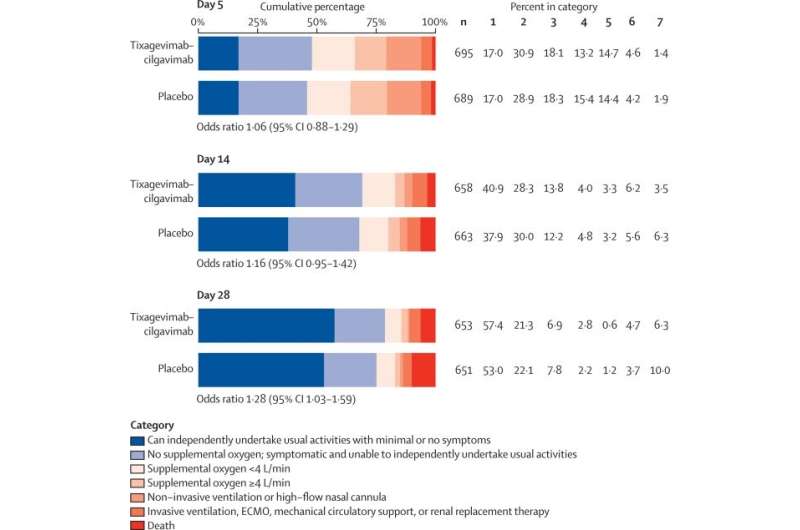Monoclonal antibody treatment reduces deaths in hospitalized COVID patients

A monoclonal antibody treatment taken by patients hospitalized with COVID-19 did not improve recovery time but did reduce deaths, according to a study published July 8 in The Lancet Respiratory Medicine.
The therapy, tixagevimab/cilgavimab, was developed and deployed quickly in response to the pandemic. Data was analyzed as part of an international NIH-sponsored clinical trial, including a site at Duke that enrolled about 10% of the study participants.
"In the very early days of COVID, approximately 25% of hospitalized patients died from their illness, and there was a huge imperative to find something that works," said co-lead author Thomas Holland, M.D., an infectious disease specialist and associate professor of medicine at Duke. "Now, with better therapies, in addition to better population immunity from vaccination and prior infections, that number is down. We still have work to do, and trials like this one help point us to additional therapies that may benefit our patients."
Data on another successful approach, using the immune modulator baricitinib in combination with the antiviral remdesivir, were also recently reported in The Lancet Respiratory Medicine. Lead author Cameron Wolfe, M.D. is an infectious disease specialist and associate professor of medicine at Duke.
"The big picture is, monoclonal antibodies are a full-spectrum treatment," Wolfe said. "They have a role from prevention, treatment of early disease, and hospitalized respiratory failure. We are hopeful this could be another class of medications for use in hospitals for COVID patients."
In the study of tixagevimab/cilgavimab, the phase 3 placebo-controlled trial included 1,455 patients and took place at 81 sites on four continents. Duke enrolled 147 patients, making it the highest enrolling site.
Patients were randomized and infused with tixagevimab/cilgavimab or a placebo, in addition to remdesivir and other standard care. By day 90, sustained recovery was achieved by 87% of people who were given tixagevimab/cilgavimab and 84% of placebo group participants. Mortality was lower by nearly 4% in the tixagevimab/cilgavimab group.
"One out of every three patients who would have died without the treatment survived after receiving the monoclonal antibodies," said co-lead author Adit Ginde, MD, MPH, professor of emergency medicine at the University of Colorado School of Medicine and emergency department physician at UCHealth University of Colorado Hospital. "That's a remarkable signal for benefit and suggests that this and other similar treatments may save lives in patients with severe COVID-19."
More information: Tixagevimab–cilgavimab for treatment of patients hospitalised with COVID-19: a randomised, double-blind, phase 3 trial, The Lancet Respiratory Medicine (2022). DOI: 10.1016/S2213-2600(22)00215-6
Cameron R Wolfe et al, Baricitinib versus dexamethasone for adults hospitalised with COVID-19 (ACTT-4): a randomised, double-blind, double placebo-controlled trial, The Lancet Respiratory Medicine (2022). DOI: 10.1016/S2213-2600(22)00088-1



















